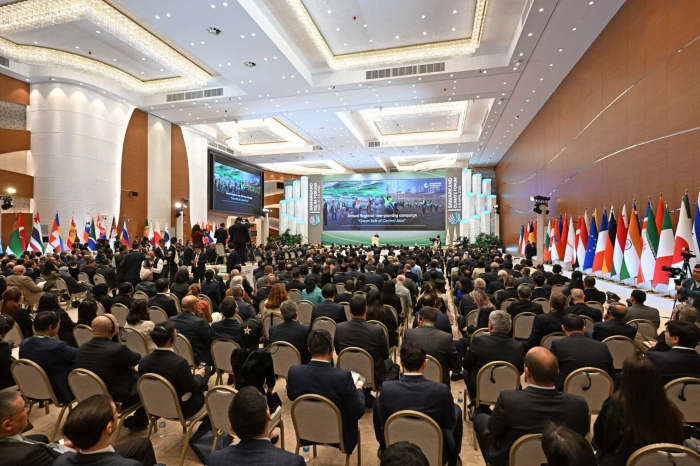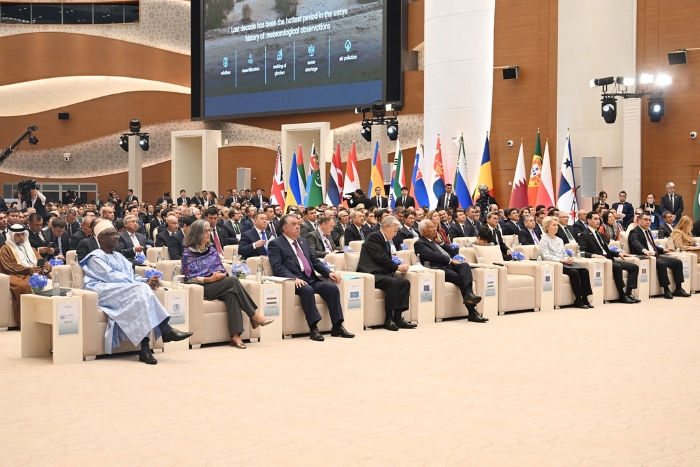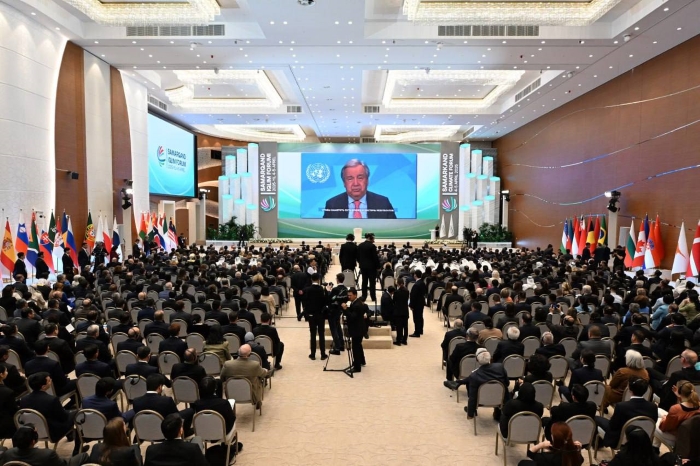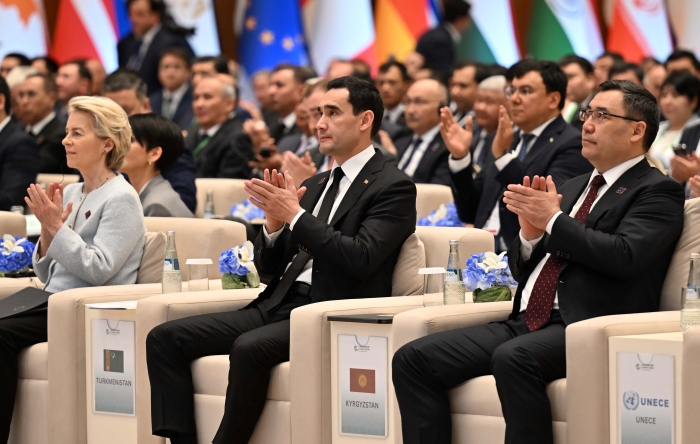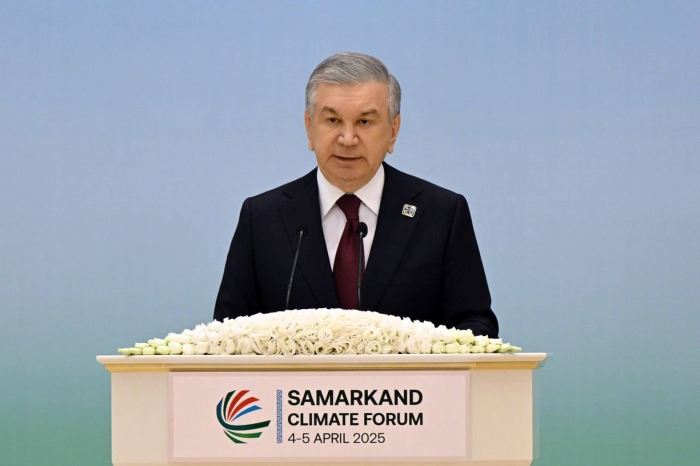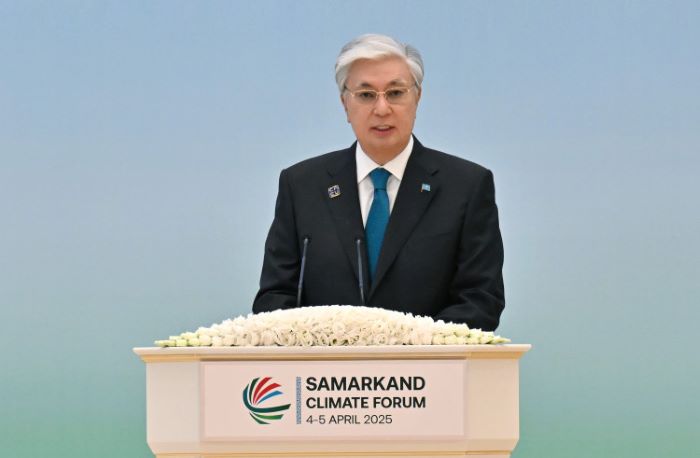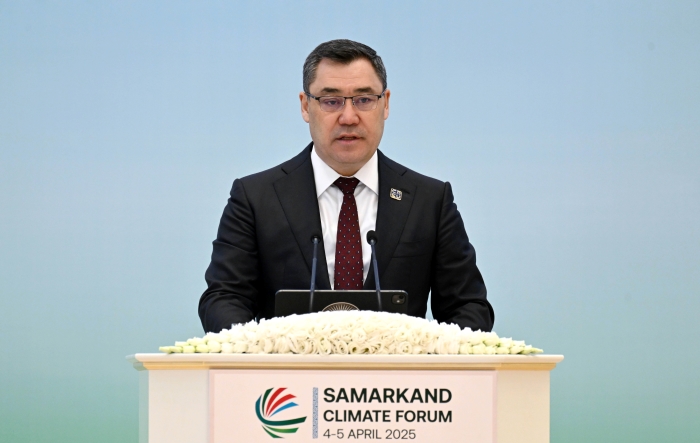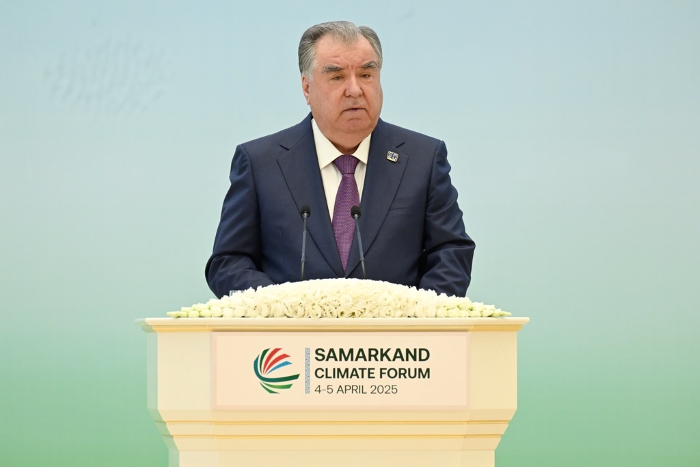On 4 April 2025, the international First Climate Forum “Central Asia in the Face of Global Climate Challenges: Consolidation for Common Prosperity” was held in Samarkand. The forum was chaired by President of Uzbekistan Shavkat Mirziyoyev.
The forum was attended by President of the European Council Antonio Costa, President of the European Commission Ursula von der Leyen, President of Kazakhstan Kassym-Jomart Tokayev, President of the Kyrgyz Republic Sadyr Japarov, President of Tajikistan Emomali Rahmon, President of Turkmenistan Serdar Berdimuhamedov, Head of the European Bank for Reconstruction and Development Odile Renaud-Basso, Executive Secretary of the European Economic Commission Tatiana Molchan, Executive Director of UN-Habitat Anaukladiya Rossbach, Ibrahim Tiau, Executive Secretary of the Convention to Combat Desertification, Ivana Živković, UNDP Assistant Administrator and Director of the Regional Bureau for Europe and the Commonwealth of Independent States (CIS), Vice President of the European Investment Bank Kyriakos Kakouris and others.
UN Secretary-General Antonio Guterres addressed the participants of the forum with a video message. “Cooperation throughout Central Asia is essential. And regional action must be complemented by global action. New national climate plans – or NDCs – due this year must align with limiting global temperature rise to 1.5 degrees Celsius, as promised. And cover all emissions and the whole economy. The G20 must lead. This is an opportunity to bring together energy transition strategies and sustainable development priorities with climate action – to attract investment and build prosperity and security. I urge all countries to take it”, Guterres stressed.
The Samarkand Climate Summit brought together over 2,000 delegates, including heads of national and global environmental organizations, international institutions, experts, scientists and journalists, and business representatives.
In accordance with the agenda, the current climate challenges facing Central Asia were discussed, issues of environmental sustainability, green economic development and regional cooperation in combating climate change were considered.
On the second day, 5 April, specialized sessions were held within the framework of the forum:
- Green economy as a path to sustainable development;
- Conservation of biological diversity and natural ecosystems of Central Asia in response to climate challenges;
- Clean energy: the basis for sustainable and environmentally friendly development;
- Integrated water resources management in the context of climate change in Central Asia;
- Youth: looking to the future with optimism
- Sustainable cities and climate challenges: integrated planning and management;
- Scientific approaches and innovative solutions to climate change: global challenges and local strategies.
Speech by President of Turkmenistan Serdar Berdimuhamedov at the international forum “Central Asia in the Face of Global Climate Challenges; Consolidation for Common Prosperity”
Dear President of the Republic of Uzbekistan, Dear Heads of State of Central Asia and leaders of the European Union,
Climate change issues traditionally occupy a special place within the framework of the Central Asia–European Union format. I believe that our task today is to provide the main, priority guidelines for cooperation and create solid prerequisites for their implementation.
In general, we consider the European Union as a promising partner on fundamental issues of the climate agenda. The basis for such cooperation is our joint commitment to the core international conventions, treaties and agreements, primarily the UN Framework Convention on Climate Change and the Paris Agreement.
The most important issue is decarbonization and reduction of methane emissions. Turkmenistan has recently taken many major practical steps along this path.
A Commission to reduce methane emissions was established in 2023. In December of the same year, Turkmenistan’s accession to the Global Methane Pledge was officially announced. The Government has adopted a Roadmap for Turkmenistan’s international cooperation with foreign countries and international organizations to reduce methane emissions into the atmosphere. As a result, by the end of 2024 alone, methane emissions in Turkmenistan have been reduced by 11 percent, which is higher than planned.
An important aspect of cooperation is the implementation of environmental initiatives of Turkmenistan. They are well-known and are both regional and global in nature.
These include the creation of a Regional Center for Climate Technologies and the preparation of a program for the transition to a circular economy. We count on the support of the European Union in the process of their implementation.
The priorities of the partnership with the EU include the “green transition” in energy, industry, transport and other important areas of the economy related to production and life support.
We invite the European Union to engage in substantive and long-term cooperation. Proposing to intensify the dialogue on the ‘green’ agenda, we consider it advisable to designate it as a separate area of activity within our format and commence developing specific plans for collaboration in the near future.
Speaking about pressing issues, I would especially highlight the water issue.
It is of fundamental importance for our region, and the technological and methodological assistance of the European Union could have positive effect on the solution of existing difficulties.
Turkmenistan’s position on water policy issues in the region is well known. They should be resolved on the basis of three key principles: respect for international law; mutual consideration of interests; and the involvement of international organizations, primarily the United Nations.
In order to preserve and strengthen good-neighborliness, development and cooperation in Central Asia, and establish a mechanism for water use from transboundary rivers in the region, Turkmenistan proposed to the UN General Assembly to consider an initiative to establish a UN Regional Council on Water Use in Central Asia.
Saving the Aral Sea is one of the key issues of environmental, socio-economic and humanitarian well–being in the region. Turkmenistan is counting on a more specific and focused international discussion of this issue, including the elaboration of measures to support the activities of the International Fund for Saving the Aral Sea on the basis of relevant resolutions of the UN General Assembly. We propose that we work together to persistently achieve the full implementation of these documents.
In conclusion, let me once again thank the President of Uzbekistan, dear Shavkat Miromonovich Mirziyoyev, for the excellent organization of the Summit, and the entire people of fraternal Uzbekistan for their hospitality and warm welcome.
Uzbekistan plans to increase the share of energy obtained from renewable energy sources to 54%
President of Uzbekistan Shavkat Mirziyoyev stressed that last year, for the first time, the global average temperature increased by more than 1.5°C. The last decade has been the hottest in the history of meteorological observations.
The negative effects of climate change are already being felt everywhere — from large-scale forest fires and desertification to water scarcity and deterioration of air quality. In response to these challenges, the Central Asian countries have developed and approved a regional Climate Change adaptation Strategy, he said.
Shavkat Mirziyoyev emphasized effective cooperation with European partners in such areas as restoration of ecosystems of the Aral Sea, development of clean energy and rational use of water. The President expressed interest in further deepening partnership with the European Union, a leader in the fight against climate change.
In his speech, the leader of Uzbekistan linked climate problems with food and energy security. More than 20% of the region’s lands are subject to degradation, and in the absence of necessary measures, yields may decrease by a third within 25 years. In this regard, he proposed to combine scientific efforts within the framework of the Horizon Europe program to increase the sustainability of the agricultural sector.
Special attention was paid to the issues of transition to a “green” economy and the development of renewable energy sources. In the next five years, Uzbekistan plans to increase the share of energy obtained from renewable energy sources to 54%, which will reduce greenhouse gas emissions by 16 million tons. The President confirmed Uzbekistan’s commitment to fulfilling its obligations under the Paris Agreement to reduce emissions by 35%.
Mirziyoyev also proposed to create a Secretariat of the EU initiative “Water–Energy – Climate Change” in Tashkent to attract investments and technologies.
He reported on water conservation measures being taken on the Amu Darya and Syr Darya rivers. These measures include concreting irrigation networks and the introduction of water-saving technologies on 2 million hectares of irrigated land, which accounts for almost half of irrigated land in Uzbekistan. In 2024, these measures have saved about 8 billion cubic meters of water.
To further promote these efforts, the President proposed the launch of a Regional water Conservation program and the holding of an international forum in the Aral Sea region. Interest was also expressed in cooperation with the EU within the framework of the Copernicus program for satellite monitoring of glaciers and assessment of climate risks.
Kazakhstan will create an International Fund for Biodiversity
President of Kazakhstan Kassym-Jomart Tokayev stressed the seriousness of the climate challenges facing Central Asia. According to him, the temperature in this region is rising twice as fast as the global average, which is causing large-scale melting of glaciers, desertification and increasing scarcity of water resources.
“The current situation requires coordinated actions by all countries in the region. We need to find a balance between economic growth and the implementation of the climate agenda,” the head of state noted.
President Tokayev detailed a range of national initiatives designed to address environmental challenges. These included a comprehensive tree-planting program across Kazakhstan, an active forest protection initiative, and the ‘Taza Kazakhstan’ campaign, aimed at cultivating environmental consciousness, especially within the younger generation. He also emphasized the collaborative project with Uzbekistan to re-vegetate the dried-up Aral Sea bed.
He further stressed Kazakhstan’s strategic commitment to the green transition, identifying key projects such as ‘green’ hydrogen production and the expansion of wind and solar energy. Additionally, he highlighted Kazakhstan’s pivotal position as a leading uranium supplier, which supports the generation of nearly 10% of the world’s electricity through nuclear power.
In order to increase energy security and reduce emissions, the country is planning to build its first nuclear power plant.
The President noted that Kazakhstan’s steppes have high potential for carbon farming, ecosystem restoration and the development of sustainable agriculture.
Significant reserves of critical raw materials, including rare earths, allow the country to participate in the creation of clean technologies and a full production cycle.
Important attention was paid to water issues: over the past 20 years, the availability of water per capita has decreased by 30%, while 70% of the region’s water resources are transboundary. The President called for international support in the development of water conservation and monitoring technologies. He also initiated the creation of the Central Asian Water and Energy Partnership.
Tokayev separately addressed the issues of biodiversity, announcing the creation of the International Biodiversity Fund under the President in Kazakhstan, which will protect the unique and endangered species of the region.
In conclusion, Kassym-Jomart Tokayev stressed that climate goals require large-scale public and private financing. “This will reduce the risks of having to work on mitigation, invest in green energy, and build a profitable, sustainable economy. Otherwise, the transition to carbon neutrality will be jeopardized. To prevent this, we must redouble our efforts, multiply and expand our partnership. No country can go through such a long and difficult path alone,” concluded the President of Kazakhstan.
Kyrgyzstan proposes steps to expand access to climate finance
Kyrgyzstan President Sadyr Japarov also addressed the critical issue of climate finance.
Japarov emphasized that billions and trillions of dollars of funding are allocated to wars and conflicts, while incomparably less funds are allocated to combat climate change and protect the environment. At the same time, the process of obtaining climate finance is still difficult. Financial resources are distributed through a large number of different funds and banking structures.
To improve the efficacy and fairness of climate finance distribution, President Japarov proposed:
- prioritizing the needs of vulnerable developing nations lacking resources and technology for climate mitigation and green transitions;
- ensuring that global climate initiatives consider mountainous developing countries alongside small island states and least developed countries;
- enhancing European partner involvement in supporting Central Asian nations with both finance and technology;
- and supporting Kyrgyzstan’s debt-for-climate-projects initiative, already endorsed by the European Union.
Japarov highlighted the severity of the glacier melting problem. “Over the past 70 years, the area of glaciers in Kyrgyzstan has decreased by 16%, and by 2100 we may lose more than half of their volume,” he said, stressing that the republic is committed to an active program of action to combat climate change.
In accordance with nationally determined contributions, Kyrgyzstan plans to reduce emissions by 16% by 2030 under the “business as usual” scenario, and by 44% with international support.
As part of the country’s efforts to achieve carbon neutrality, 18 small hydropower plants have been commissioned in Kyrgyzstan over the past four years.
Japarov also spoke about the international events that will be held within the framework of the Mountain Five-year Plan (2023-2027), announced by the UN at the initiative of Kyrgyzstan.
Thus, on 24-25 April 2025, Kyrgyzstan will host the international conference “Global Mountain Dialogue for Sustainable Development”; in 2026, the pre-summit in New York; in 2027, the Second Bishkek+25 Global Mountain Summit, which will summarize the results and identify further steps to preserve mountain ecosystems.
Tajikistan: glacier conservation and development of “green” energy are the key to the region’s climate sustainability
President of Tajikistan Emomali Rahmon said that the annual deficit in financing climate programs in Tajikistan exceeds $ 400 million, and in case of large-scale consequences, this amount may reach 1.5 billion. He emphasized that only a united Central Asian effort, bolstered by international support, can effectively address these threats.
President Rahmon underscored the critical role of ‘green’ energy in sustainable development. He noted Tajikistan’s leading position in hydropower generation, providing 98% of its electricity, and its global ranking as sixth in renewable energy usage. He further outlined the country’s ambition to achieve full renewable energy reliance by 2032, contributing significantly to global climate action.
The President also recalled the critical role of Tajik glaciers, which provide 60% of the water resources of the entire Central Asia. However, climate change threatens these natural springs: over the past 50 years, about 1,300 of the 14,000 glaciers in the country have completely melted. This is of serious concern, because glaciers play not only a water-supply, but also a climate-regulating role in the region.
Emomali Rahmon recalled that, at the initiative of Tajikistan, the UN General Assembly declared 2025 the International Year of Glacier Conservation, and March 21 the World Glacier Day. In this context, he invited the forum participants to participate in the first High-level International Conference on Glacier Conservation, which will be held in Dushanbe this May. ///nCa, 5 April 2025 [photo credit – official websites of the Presidents of Uzbekistan, Tajikistan, Kyrgyzstan, Kazakhstan/TDH)
